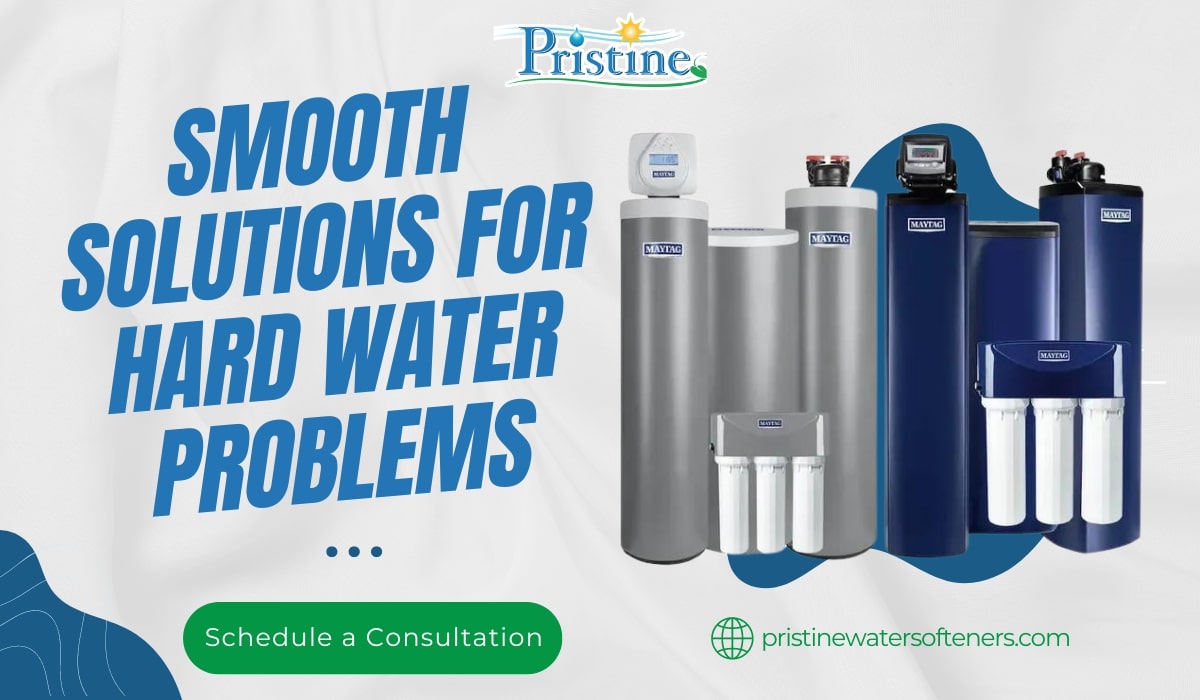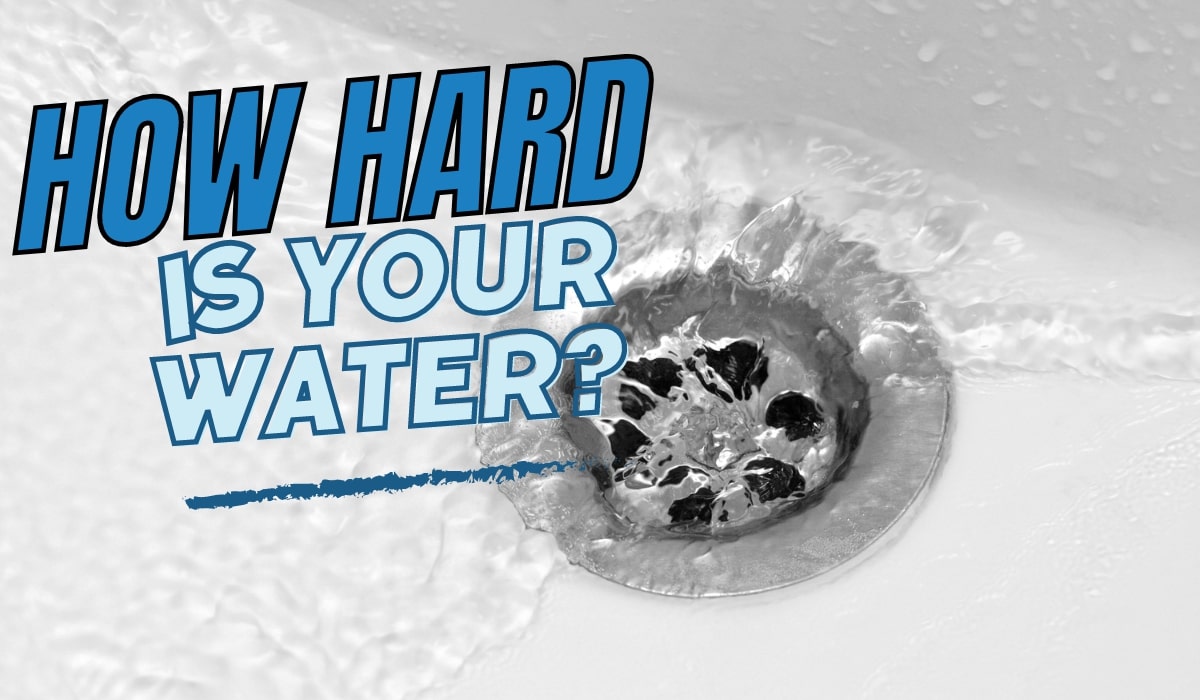Have you ever noticed those unsightly white spots on your dishes or the soap scum in your shower? Let’s talk about water hardness. You’re in the right place if you’ve ever wondered why your appliances don’t last as long as they should or why your skin feels dry and itchy. We’re about to explore understanding water hardness levels and how to choose a water softener for your home.
What Is Water Hardness?
Water hardness is determined by the amount of dissolved calcium and magnesium in your water. While these minerals aren’t harmful to your health, they can cause various issues in your home. From clogging pipes to reducing the efficiency of your appliances, hard water can be a real nuisance.
Signs Of Hard Water
- Soap Scum and Residue: Ever noticed a filmy residue on your skin or in your tub? That’s hard water at work.
- Spotty Dishes: Those white spots on your glasses and cutlery are a telltale sign.
- Faded Laundry: Hard water can make your clothes look dull and feel scratchy.
- Scale Buildup: Look inside your kettle or on your faucets. The white, crusty buildup is a clear indication of hard water.
Why Is Water Hardness A Problem?
While hard water isn’t a health risk, it can wreak havoc on your home. The minerals in hard water can build up inside your pipes, reducing water flow and increasing the pressure on your plumbing. This can lead to costly repairs. Your appliances, like dishwashers and washing machines, must also work harder and use more energy, leading to higher utility bills.
Benefits Of Soft Water
Soft water can transform your home. Here’s how:
- Better Cleaning: Soft water makes cleaning your home, dishes, and laundry easier. You’ll notice less soap scum and cleaner results.
- Longer-Lasting Appliances: Without the mineral buildup, your appliances will last longer and work more efficiently.
- Softer Skin and Hair: Say goodbye to dry, itchy skin and dull hair. Soft water is gentler on your skin and hair.
- Lower Utility Bills: Efficient appliances mean lower energy consumption and reduced utility bills.
How to Choose a Water Softener for Your Home
Choosing the right water softener for your home can be daunting. But don’t worry—we’ve got you covered. Here’s a step-by-step guide to choosing a water softener system that suits your needs.
1. Determine Your Water Hardness Level
The first step is to determine the hardness level of your water. You can do this by:
- Water Testing Kits: Available online or at home improvement stores, these kits can give you a quick idea of your water hardness level.
- Professional Testing: You can hire a professional to test your water for a more accurate reading.
2. Understand Your Water Usage
Next, you’ll need to determine how much water your household uses. This will help you determine the capacity of the water softener you need. Consider:
- Household Size: The number of people in your home.
- Water-Using Appliances: The number of appliances that use water.
3. Choose The Right Type Of Water Softener
There are several types of water softeners available. Here’s a quick rundown:
- Salt-Based Ion Exchange Softeners: These are the most common and effective. They use resin beads to exchange hardness minerals with sodium ions.
- Salt-Free Water Softeners: use different technologies to condition the water and prevent scale buildup.
- Dual-Tank Softeners: Ideal for large households or homes with high water usage, these softeners have two tanks to ensure you always have access to soft water.
- Magnetic Water Softeners: These are easy to install and maintain but less effective than others.
4. Consider The Regeneration Process
Water softeners must regenerate to remove the accumulated minerals from the resin beads. There are two main types of regeneration processes:
- Timed Regeneration: This type regenerates at a set time, regardless of how much water has been used.
- Metered Regeneration: This type regenerates based on actual water usage, making it more efficient and economical.
5. Evaluate The Cost
Water softeners can vary widely in price. Consider both the initial cost and the ongoing maintenance costs, including:
- Salt: For salt-based water softener systems, you’ll need to purchase salt regularly.
- Maintenance: Some systems require more maintenance than others.
6. Look For Additional Features
Modern water softeners come with various features that can make your life easier. Look for:
- Digital Displays: These can provide helpful information and make it easier to adjust settings.
- Low-salt indicators alert you when it’s time to add more salt.
- Water Usage Monitoring: This can help you track your water usage and adjust as needed.
7. Read Reviews and Get Recommendations
Before purchasing, read reviews and get recommendations from friends or family members with water softeners. This can help you understand the reliability and performance of different models.
Installation And Maintenance
Once you’ve chosen a water softener, the next step is installation. While some handy homeowners may be able to install a water softener themselves, it’s often best to hire a professional to ensure it’s installed correctly. After installation, regular maintenance is vital to keeping your water softener running smoothly.
Installation Tips
- Location: Choose a location near your main water line and a drain.
- Bypass Valve: Ensure your water softener has a bypass valve so you can quickly shut it off for maintenance or repairs.
- Electrical Outlet: Most water softeners must be plugged in, so ensure an outlet is nearby.
Maintenance Tips
- Regularly Check Salt Levels: Monitor the salt level in your brine tank and refill it as needed.
- Clean the Brine Tank: Periodically clean the brine tank to prevent salt buildup.
- Check for Leaks: Regularly inspect your water softener for leaks or other issues.
- Professional Servicing: Consider having your water softener professionally serviced once a year to ensure it’s in good working order.
The Environmental Impact of Water Softeners
When choosing a water softener system, the environmental impact must be considered. Traditional salt-based water softeners can contribute to salt buildup in wastewater, harming local ecosystems.
Salt-Free Alternatives
If you’re concerned about the environment, look into salt-free alternatives. These systems use different technologies to condition water without adding salt, making them a greener choice for choosing a water softener for your home.
Reducing Water Waste
Newer models of water softeners are designed to be more efficient, reducing the amount of water wasted during regeneration. Look for systems with metered regeneration to minimize water usage.
Health Considerations
You might also consider the health implications when choosing a water softener system. While softened water is generally safe to drink, some people prefer to limit their sodium intake.
Sodium Levels in Softened Water
Although the sodium added to softened water is minimal, those on a low-sodium diet might want to explore other options. If you’re wondering how to choose a water softener for your home, consider systems that allow you to adjust the sodium level or look into potassium-based softeners.
Drinking Water Options
For those concerned about drinking softened water, installing a reverse osmosis system can help. This system will further purify the water, ensuring it’s free from unwanted minerals or sodium, another factor to consider when choosing a water softener for your home.
Choosing the Right Size
When learning how to choose a water softener system, size matters. A water softener that’s too small won’t be effective, while one that’s too large could be an unnecessary expense.
Calculating the Right Capacity
To determine the right size, consider your household’s daily water usage and the hardness level of your water. This calculation will help you understand how to choose a water softener for your home that meets your specific needs without overspending.
Future-Proofing Your Purchase
Think about potential changes in your household size or water usage. This foresight can guide you in choosing a water softener system that will be effective for years.
Water Softener Efficiency Ratings
Efficiency is a crucial consideration when choosing a water softener system. Higher efficiency ratings can lead to cost savings and environmental benefits.
Understanding Efficiency Ratings
Efficiency ratings are determined by the amount of salt and water used during regeneration. A more efficient water softener will use less of both, which is essential when choosing a water softener for your home.
Energy Star Ratings
Look for water softeners with Energy Star ratings. These systems meet specific criteria for energy efficiency, making them a smart choice for those researching how to choose a water softener for your home.
Advanced Features To Consider
Modern water softeners come with various advanced features that can enhance their functionality and ease of use.
Smart Technology
Some water softeners now come with innovative technology, allowing you to monitor and control the system from your smartphone. This feature can provide insights into your water usage and help you understand how to choose a water softener system that fits seamlessly into your tech-savvy lifestyle.
Self-Cleaning Systems
Self-cleaning systems can reduce the maintenance required, making them a convenient option when choosing a water softener for your home. These systems automatically clean the resin beads, ensuring consistent performance.
Common Myths About Water Softeners
There are many misconceptions about water softeners. Let’s debunk some of the most common myths:
Myth 1: Soft Water is Salty
One of the biggest misconceptions is that soft water tastes salty. In reality, the amount of sodium added to the water is minimal and usually undetectable.
Myth 2: Water Softeners Waste Water
While it’s true that water softeners use water during the regeneration process, modern systems are much more efficient and use less water than older models.
Myth 3: All Water Softeners are the Same
Not all water softeners are created equal. Different types have varying levels of effectiveness and features. It’s essential to choose the right one for your specific needs.
Myth 4: Water Softeners Remove All Minerals
Water softeners specifically target calcium and magnesium, the minerals responsible for hardness. They do not remove all minerals from the water.
Myth 5: You Can’t Use Softened Water for Drinking
Softened water is safe to drink. However, if you’re concerned about sodium levels, you can use a reverse osmosis system to purify your drinking water further.
Start Enjoying The Benefits Of Soft Water Today!
Ready to transform your home with soft water? Start by testing your water hardness level and exploring the different types of water softeners available. You’ll enjoy cleaner dishes, smoother skin, and longer-lasting appliances with the proper water softener.
Ready to experience the transformative benefits of soft water in your home? Don’t wait any longer! At Pristine Water Softeners, we specialize in providing top-of-the-line water softener systems tailored to your unique needs. Our expert team is here to help you every step of the way, from selecting the perfect system to professional installation and ongoing maintenance. Discover the difference soft water can make. Contact Pristine Water Softeners today and take the first step towards a cleaner, more efficient home.


